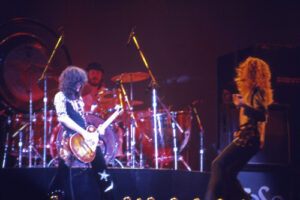
Feature Photo: ChrisJamesRyanPhotography / Shutterstock.com
Blue Öyster Cult emerged from Long Island, New York in the late 1960s, originally performing under various names before settling on their distinctive moniker in 1971. The band was initially conceived by rock critic and producer Sandy Pearlman and keyboardist Allen Lanier as a heavy metal group with literary and intellectual pretensions, incorporating elements of science fiction, horror, and fantasy themes into their music. With their mysterious logo featuring the alchemical symbol for lead and their enigmatic stage presence, Blue Öyster Cult carved out a unique niche in the hard rock landscape of the 1970s. Their sound blended heavy metal with psychedelic rock, progressive elements, and sophisticated songwriting that set them apart from their more straightforward heavy rock contemporaries.
The band achieved their greatest commercial success in the mid-1970s with albums like Secret Treaties and Agents of Fortune, the latter spawning their biggest hit “(Don’t Fear) The Reaper,” which became a classic rock staple. Throughout their career, Blue Öyster Cult has been known for their cryptic imagery and theatrical live performances, often incorporating lasers and elaborate stage productions. Their album covers have consistently reflected their fascination with science fiction and literary themes, featuring striking artwork that ranges from surreal imagery to fantasy art. From their debut’s stark black and white photography to the intricate fantasy art of later releases, their visual identity has remained as compelling and enigmatic as their music, helping to establish them as one of the most distinctive bands in hard rock history.
# 10 – The Symbol Remains (2020)
Blue Öyster Cult roared back on October 9, 2020 with a studio statement that proved the chemistry still sparks after a long silence, the core of Eric Bloom and Buck Dharma now flanked by Richie Castellano, Danny Miranda, and Jules Radino delivering sharp modern riff craft that still nods to the band’s sly storytelling. The production stayed inside the family with Bloom, Dharma, and Castellano at the helm, and the mix from Tom Lord Alge gave the guitars bite without crowding the harmonies. The cover art matters here, because the Blue Öyster Cult symbol is the promise in the title and the artwork makes that promise feel immortal, a vivid sci-fi tableau created and laid out by Stan W Decker that folds classic imagery into a new world and sells the idea that the symbol truly remains.
# 9 – Extraterrestrial Live (1982)
Released April 19, 1982, this concert document captures the band charging through the Fire of Unknown Origin tour with authority while tipping back to the Mirrors era and the Black and Blue run with Sabbath. The lineup onstage is Eric Bloom, Buck Dharma, Allen Lanier, Joe Bouchard, with Rick Downey on drums for most of the set after Albert Bouchard’s mid tour exit, and Albert still appears on select cuts, a snapshot of a volatile year that somehow sharpened the performances. “Burnin’ for You” hits with radio fresh momentum, “Veteran of the Psychic Wars” seethes, “The Reaper” closes with poise, and there is even a wild “Roadhouse Blues” guest spot that underlines the band’s bar band heart inside the arena shell. The artwork is a gem from illustrator Greg Scott, a vividly imagined extraterrestrial tour vision that turns the whole stage show into science fiction and pairs perfectly with the title.
# 8 – Ghost Stories (2024)
Ghost Stories came out in 2024 as a final sweep through the vaults that stitches late seventies and early eighties tapes with a 2016 session into a cohesive goodbye. The lineup on these tracks spans eras, but the band’s core voice stays unmistakable through Eric Bloom, Donald “Buck Dharma” Roeser, Allen Lanier, Joe Bouchard, and Albert Bouchard with later members helping finish the material. “So Supernatural” set the tone while the set also folds in “Kick Out the Jams” and a faithful “If I Fell.” The cover locks into the band’s mystique with a spectral cityscape rendered by Stan W. Decker whose dramatic, high contrast style Frontiers used on their recent cycle.
# 7 – Fire of Unknown Origin (1981)
Fire of Unknown Origin arrived in 1981 with the original five firing again under producer Martin Birch, turning “Burnin’ for You” into a radio juggernaut and sharpening the cinematic sweep of “Veteran of the Psychic Wars” and “Joan Crawford.” The artwork is a key part of its mood. Illustrator Greg Scott delivered that eerie blue lit tableau which amplifies the album’s apocalyptic shimmer before a note even plays. Band on the record. Eric Bloom. Buck Dharma. Allen Lanier. Joe Bouchard. Albert Bouchard.
# 6 – Tyranny and Mutation (1973)
Tyranny and Mutation pushed harder in 1973 with the Black side and the Red side idea mirroring the band’s obsessions with tension and release. Same classic lineup across the grooves. Eric Bloom. Buck Dharma. Allen Lanier. Joe Bouchard. Albert Bouchard. “The Red and the Black,” “Hot Rails to Hell,” and “Baby Ice Dog” drive the set. Bill Gawlik’s stark design work gives the cover its austere black white and blood red presence and became a cornerstone of the band’s early visual identity.
# 5 – Blue Öyster Cult (1972)
Blue Öyster Cult set the template in 1972. The debut’s taut, nocturnal rock introduced “Cities on Flame with Rock and Roll,” “Transmaniacon MC,” and “Then Came the Last Days of May,” all cut by the five man engine of Bloom, Buck Dharma, Lanier, Joe Bouchard, and Albert Bouchard. Bill Gawlik crafted the hypnotic monochrome cover and the hook and cross logo that became synonymous with the band’s mythos. That symbol’s alchemical weight matches the music’s cool menace.
# 4 – Agents of Fortune (1976)
I always thought that this was one of the most interesting covers and because of the huge success of “Don’t Fear The Reaper” the cover art and it’s fine details were overlooked. Agents of Fortune presents a magician’s invitation rather than a static portrait. Painter Lynn Curlee depicts Belgian illusionist Servais Le Roy in tuxedo, framed by a stone arch, extending a fan of tarot cards directly toward the viewer, the Blue Öyster Cult hook and cross emblem carved into the stone beneath his hand. Columbia’s John Berg and Andy Engel shape the design with cool, theatrical lighting and a restrained palette, which heighten the sense of ceremony and draw you into the band’s world of ritual, fate, and controlled mystery.
# 3 – Cultösaurus Erectus (1980)
June 1980 brought a course correction, the band handing the console to producer Martin Birch and leaning back into heavier textures without losing the wit, with Eric Bloom, Buck Dharma, Allen Lanier, Joe Bouchard, and Albert Bouchard all present and firing. The sleeve is legendary in its own right, a detail from Richard Clifton Dey’s painting Behemoth’s World that places a many eyed beast in a stark landscape, with Paula Scher’s cover design giving the image the museum piece framing it deserves, a perfect marriage of heavy music and fantastical art.
# 2 – Secret Treaties (1974)
Secret Treaties from 1974 is lean, cryptic, and endlessly replayable. “Career of Evil,” “Dominance and Submission,” and “Astronomy” cemented the band’s dark literature. The jacket is iconic for a reason. Artist Ron Lesser places the band with a Messerschmitt Me 262 on an airfield which ties directly to “ME 262” and to the album’s whispered geopolitics. The image’s calm chill matches the music’s precision.
# 1 – On Your Feet or on Your Knees – Live Album (1975)
We go with a live album for our favorite blue oyster cold album cover. Hey why not? Dropped February 27, 1975, the first live set finds the original five at full throttle, Eric Bloom, Buck Dharma, Allen Lanier, Joe Bouchard, and Albert Bouchard burning through material from the first three records and salting the track list with a snarling “Buck’s Boogie,” a molten “Cities on Flame,” and a barnstorming take on “Born to Be Wild.” You can hear the road miles in the tightness, you can hear New York attitude in the tempo pushes, and you can hear how the songs harden when they meet the crowd. The cover is iconic for good reason, the stark black and silver treatment anchored by Gerard Huerta’s lettering and a John Berg photograph that spotlights St Paul’s Episcopal Chapel in South Salem, New York, an image that turns a church facade into a cathedral of volume and gives the record its ominous promise before the needle even drops.
Check out similar articles on ClassicRockHistory.com Just click on any of the links below……
Eric Bloom of Blue Öyster Cult: The ClassicRockHistory.com Interview
Albert Bouchard of Blue Öyster Cult: The ClassicRockHistory.com Interview
Joe Bouchard (Blue Oyster Cult): ClassicRockHistory.Com Interview
Top 10 Blue Oyster Cult Albums
Top 10 Blue Oyster Cult Songs
Top 10 Covers Of Blue Öyster Cult Songs
Blue Öyster Cult’s Best Song On Each Of Their Studio Albums
Complete List Of Blue Öyster Cult Albums And Discography
Read More: Artists’ Interviews Directory At ClassicRockHistory.com
Read More: Classic Rock Bands List And Directory













































